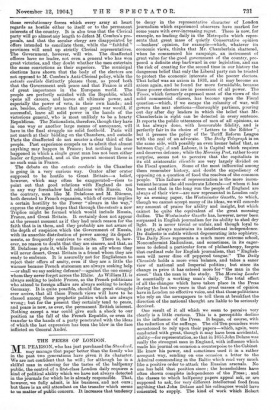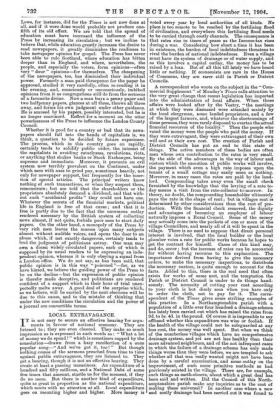M R. PEARSON, who has just purchased the Standard, may manage
that paper better than the family who in the past two generations have given it its character. We are not confident that he will ; for although he is a skilful man in catering for the tastes of the halfpenny public, the control of a first-class London daily requires a kind of political ability which we have not always detected in the journals for which he is already responsible. That, however, we fully admit, is his business, and not ours ; but there is an evil attendant on the transfer which seems to us matter of public concern. It increases that tendency to decay in the representative character of London journalism which experienced observers have marked for some years with ever-increasing regret. There is now, for example, no leading daily in the Metropolis which repre- sents that great mass of quietly Conservative opinion —bankers' opinion, for example—which, whatever its economic views, thinks that Mr. Chamberlain shattered, when he commenced his campaign, an instrument of great value for the good government of the country, pro- posed a definite step backward in our legislation, and ran the risk of creating for the second time in our history the dangerous belief that only the Liberal party can be trusted to protect the economic interests of the poorer electors. That belief was an axiom in 1831, and it may become an axiom again, and be found far more formidable, because those poorer electors are in possession of all power. The Times, which formerly expressed most of the views of the solid commercial classes, has become upon the Fiscal question—which, if we escape the calamity of war, will govern the next elections—thoroughly partisan, pouring out day after day leaders in which the belief that Mr. Chamberlain is right can be detected in every sentence. It reports the public utterances of men of all opinions, as it has always done, with honourable fidelity, and is perfectly fair in its choice of " Letters to the Editor " ; but it presses the policy of the Tariff Reform League with the zeal of an advocate. The Daily Telegraph is on the same side, with possibly an even keener belief that, as between Capi_al and Labour, it is Capital which requires and deserves defence ; while the Morning Post, rather to our surprise, seems not to perceive that the capitalists in its old aristocratic clientele are very largely divided on the Fiscal question. Some of the most influential among them remember history, and doubt the expediency of opposing on a question of food the resolves of the common people. This failure of representation is the more incon- venient because the old moderate Liberals—of whom it has been said that in the long run the people of England are always of their view—are now represented in London only by an evening paper, the Westminster Gazette, to which, though we cannot accept many of its ideas, we will concede any amount of praise for ability and insight, but which cannot be quite the equivalent of the great morning dailies. The Westminster Gazette has, however, never been surpassed in English journalism for its ability to shed dry light. It is never trivial or unfair, and though loyal to its party, always maintains its intellectual independence. Its dialectic is subtle without degenerating into sophistry. The Daily News represents a much more extreme school, Nonconformist Radicalism, and sometimes, in its eager- ness to defend a particular form of philanthropy, forgets that cardinal rule for English journalism, that " English- men will never dine off peppered tongue." The Daily Chronicle holds a more even balance, and takes a saner view of national and Imperial politics ; but since its change in price it has catered more for "the man in the street" than the man in the study. The Morning Leader is essentially a working man's daily. The total effect of all the changes which have taken place in the Press during the last two years is that great masses of opinion have in London no effective voice, and that those politicians who rely on the newspapers to tell them at breakfast the direction of the national thought are liable to be seriously deceived.
One result of it all which we seem to perceive very clearly is a little curious. This is a perceptible decline in the influence of the Press. It began, of course, with the reduction of the suffrage. The old Ten-pounders were accustomed to rely upon their papers—which, again, were conducted with great, though it may have been accidental, ability—for representation, so that in 1855 John Delane was really the strongest man in England, with influence which made his journal on occasion a counterpoise to the Cabinet He knew his power, and sometimes used it in a rather arrogant way, sending on one occasion a letter to the Admiral commanding in the Baltic which read very much like a positive order to attack the Russian arsenals. No one has held that position since ; the householders have often shown complete independence of the Press ; and the classes to which halfpenny papers appeal ask, or, are supposed to ask, for very different intellectual food from anything that John Delano and his colleagues would have consented to supply. The kind of work which Robert Lowe, for instance, did for the Times is not now done at all, and if it were done would probably not produce one- fifth of its old effect. We are told that the spread of education must have increased the influence of the Press by increasing its circulation ; but we incline to believe that, while education greatly increases the desire to read newspapers, it greatly diminishes the readiness to take newspaper opinion for gospel. The Press has never been able to rule Scotland, where education has bitten deeper than in England, and where, nevertheless, the people, and especially the voters, form opinions—often very " dour " opinions—for themselves. The cheapening of the newspapers, too, has diminished their individual power. Formerly a man paid threepence for the paper he approved, studied it very carefully, often re-reading it in the evening, and, consciously or unconsciously, imbibed opinions from it as congregations still do from the sermons of a favourite divine. Now a man buys a penny paper and two halfpenny papers, glances at all three, throws all three away, and forms his own judgment under other guidance. He is amused by his papers, possibly interested, but he is no longer convinced. Reflect for a moment on the utter powerlessness of the Press to influence the London County Council.
Whether it is good for a country or bad that its news- papers should fall into the hande of capitalists is, we think, a question to be decided by future experience. The process, which in this country goes on rapidly, certainly tends to solidify public order, the interest of the capitalists in avoiding cataclysms, revolutions, riots, or anything that shakes banks or Stock Exchanges, being supreme and immediate. Moreover, it prevents an evil system now terribly prevalent on the Continent, under which men with axes to grind pay, sometimes heavily, not only for newspaper support, but frequently for the inser- tion of special articles. The principal writers know nothing of such transactions, or when they suspect them, remonstrate; but are told that the shareholders or the proprietors absolutely demand a dividend, and that with- out such " accidental profits " they could not have one. Whatever the secrets of the financial markets, political life in England is free of that curse ; and that it is free is partly due to the fact that the enormous outlay rendered necessary by the British system of collecting news almost, if not quite, forbids poor men to start daily papers. On the other hand, a monopoly of the Press by very rich men leaves the masses upon many subjects almost without audible voices, and opens the door to an abuse which, if not exactly dangerous, certainly tends to lead the judgment of politicians astray. One man may own a dozen widely circulated papers, each of which is supposed by its usual readers to be expressing an inde- pendent opinion, whereas it is only obeying a signal from a London office. We do not say, as has been said, that public opinion is in this way " poisoned "—for, as we have hinted, we believe the guiding power of the Press to be on the decline—but the expression of public opinion is thereby made deceptive, and politicians are rendered confident of a support which in their hour of trial unex- pectedly melts away. A good deal of the surprise which, as we believe, will be excited by the next elections will be due to this cause, and to the mistake of thinking that under the new conditions the circulation and the power of a journal are convertible terms.
LOCAL EXTRAVAGANCE.











































 Previous page
Previous page